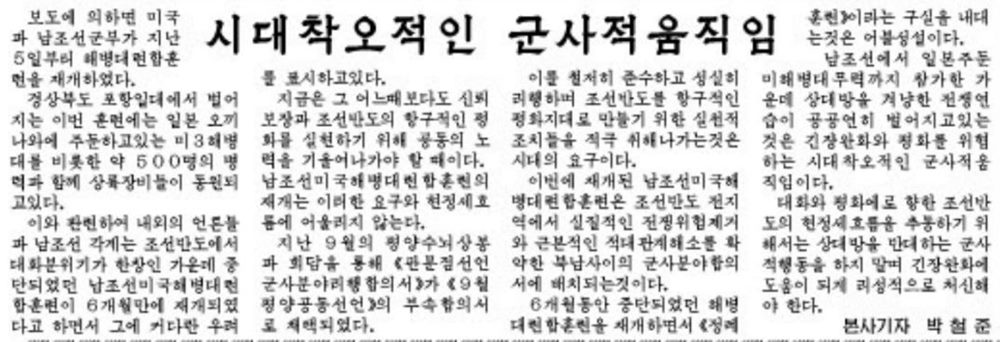
An order signed by Supreme Commander Kim Jong Un was handed down to the Naval Command on November 12 for the navy to adopt a “battle posture,” according to sources inside the country. The order came on the heels of a November 3 order to “protect the West Sea maritime demarcation line at all costs” and questions now center on why the order was made.
“An order was handed down to the Naval Command on November 12 to adopt a battle posture in the West Sea,” said Pyongyang-based source on November 28. “The order was signed by the Supreme Commander of the Korean People’s Army.”
North Korea’s operational commands include “a state of war,” “near state of war,” “battle-readiness posture,” “battle preparation posture,” “battle alert posture,” and “alert posture.”
According to a separate source in Pyongyang, the levels of “battle-readiness posture” and above implement an emergency chain of command that places the country’s Party, military and government departments under the direct control of the Supreme Commander, and prohibits all military officials from leaving their stations for any reason. The administrative operations for frontline, rear-guard and security-related military bases are also moved underground and all are required to adopt a “battle preparation posture.”
“Military operations officials were ordered to thoroughly check communications equipment for operational training and wartime line of command for the entire navy, from the Naval Command to ships that would be involved in battle. Engineering officials were ordered to establish detailed plans for completing preparations for battle in close cooperation with the Naval Command,” he said.
“Administrative and political officials were ordered to conduct political training with the most ideologically fit and experienced military commanders. Another order directed officials to conduct on-site inspections of each naval division and that officer training must occur prior to the 1st Comprehensive Battle Exercises in 2019.”
Moreover, he added, rearguard officials were ordered to inspect all wartime operational supplies (fuel, food, etc) and place an emphasis on addressing any deficits. In other words, the order is aimed at ensuring the rearguard was also fully prepared for battle.

The state-run publication Rodong Sinmun published an article on November 12 criticizing the restarting of the Korea Marine Exchange Program (KMEP) as an “outdated act of militarism” that “goes against” the agreement made by North and South Korean military officials. This strongly suggests that the order handed down the same day was a response to the restart of KMEP.
KMEP was delayed to ensure the smooth progress of inter-Korean and US-DPRK dialogue aimed at denuclearization of the Korean Peninsula and establishing long-term peace. The program was restarted after six months of being postponed, however, and was held for two weeks from November 5. North Korea has handed down similar orders to the military aimed at increasing their defensive posture when large-scale US-ROK military exercises involving American aircraft carriers and stealth bombers take place.
That being said, through the military agreement on September 19, the two Koreas have agreed to specific measures aimed at easing military confrontation and building mutual trust. Moreover, the two Koreas have recently taken steps to set a buffer zone in the West Sea aimed at preventing armed clashes. The order is thus unusual given that it comes just a short time after these agreements were made.
Some observers suggest that the order proves that North Korea does not have any confidence in the agreements made.
Just two days after the buffer zone was agreed upon (and implemented on November 1), North Korea handed down an order to its Naval Command to protect the West Sea maritime demarcation line “at all costs” and respond vigorously to intrusions across the line.
Moreover, on November 3, North Korea’s military captured but immediately released a South Korean fishing boat operating in South Korean territorial waters in the East Sea. Some observers suggest that such incidents may disrupt the progress being made toward peace between the two Koreas.




















